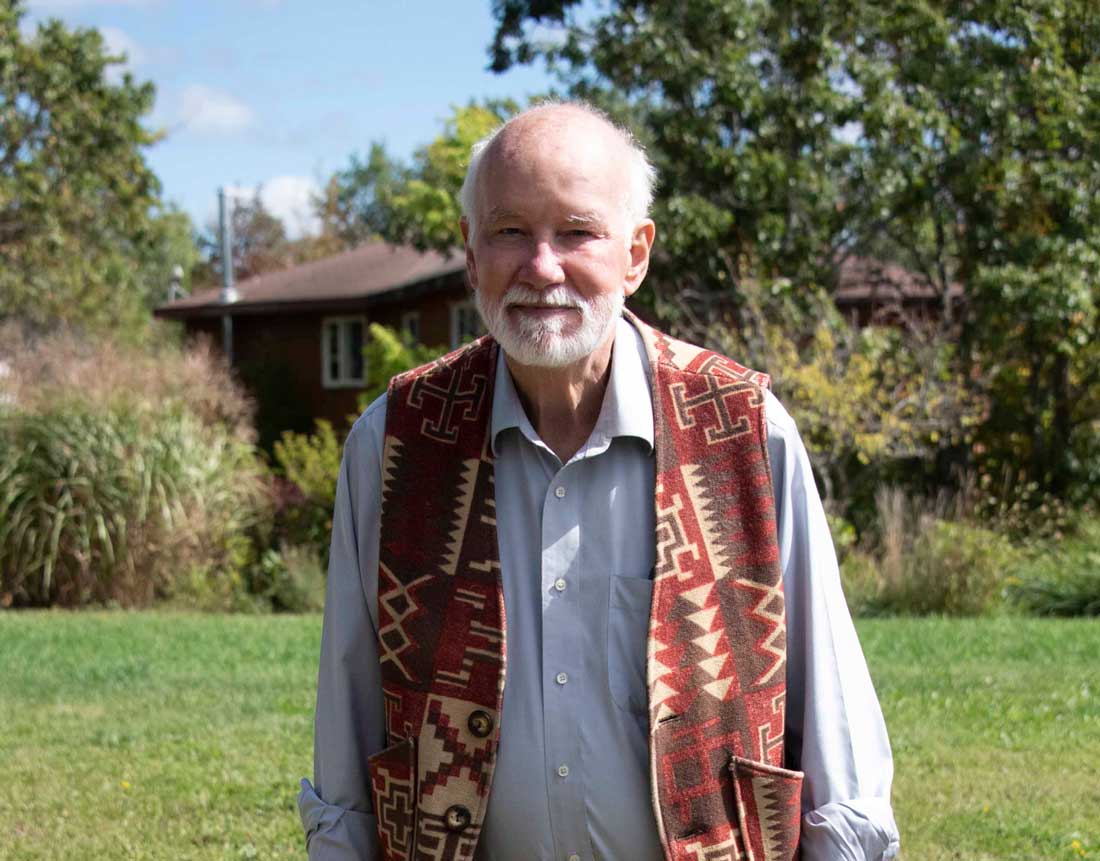Paul at home, September 2022.
by Petra Wall
Paul and Suzanne Darlaston live among the Kagawong families who call Rainbow Heights their home. They share their home with two charming dogs, Sadie and Flash, the latter of whom is as fast as ‘The Flash’ comic hero and loves to play tag on the lawn with Sadie. This attractive well-treed area enjoys the freedoms of rural life as well as the attributes of living within the village outskirts of Kagawong, the main part of which is nestled just below the bluff, on the south Shore of Manitoulin’s Mudge Bay. Shadow, the neighbour’s dog, visits daily for biscuit treats and then returns home, somewhat subdued by Sadie’s leadership. Many other species, deer, squirrels, racoons, chipmunks and wild turkeys also pay regular visits.
Paul begins by summarizing his working life: “In the course of my career, I have worked for manufacturing companies: iron and steel makers, shoemaking equipment engineering, coffee and custard manufacturers, engineering, corporate insurance, Schedule ‘A’ banks and many Ontario government ministries and agencies.” The common factor linking them all was his expertise in information technology. “As my expertise in the bits and bytes of data management became more specialized, my knowledge of what goes on in factories, banks, government and the private sector, with respect to the accumulation of personal information, expanded at a tremendous rate.”
Paul’s career became more specialized after he was invited to perform one of the first privacy assessments of the collection and use of personal information within the Ontario government. This is where law, policy and IT came together. Typically, privacy consultants had strong legal or policy backgrounds but lacked in the depth of IT knowledge, Paul’s specialty. This was a valuable differentiator. He had implemented access control systems in four major data centres, advised the implementation team on a fifth, and was familiar with options to provide security protections of data both in storage and in transmission.
“My mother Winifred Ellen or ‘Nell’ was 44 when I was born in Loughborough, England in 1942. I guess I was unexpected. My brothers Peter and Patrick were 20 and 15 years older, respectively. My paternal grandparents hailed from Nuneaton, England. My father Samuel James or ‘S.J.’ was born in 1899. All four of my grandparents died before I arrived. My paternal grandparents were coal miners. Grandmother Darlaston didn’t want her sons to work the coal face, so she accumulated money to buy up old miners’ cottages, refurbish them and profitably rent them out.”
During World War I, family legend has it that Paul’s father lied about his age and enlisted at 16, in 1915. He finished as a gunnery instructor. When he came home his mother lent him 1,000 pounds to purchase a bankrupt menswear business, The London Tailoring Company. He paid his mother back within the year. For most of Paul’s life, S.J. had three stores selling clothing for gentlemen. When he retired, he passed the shops on to eldest son Peter with some strings attached. The business has evolved, targeting a more modern market today.
Paul’s maternal grandfather Mannion was a tenant farmer in County Roscommon, Republic of Ireland. Grandfather died unexpectedly, in his mid-thirties, leaving a widow and two children. Typically, destitute families were evicted by the local land agent, as ordered by the absentee English landowner. “Thus, my widowed grandmother moved to England with her two teen offspring,” Paul’s mother and uncle. “She became a housekeeper for a widower with children. Later she married her employer and they started their own family.”
At this point, we gaze outside to see Flash, the bossy Boston Terrier-Poodle cross, chase a pair of wild turkeys that announce their displeasure with loud squawking as they fly up into the surrounding trees. Silence returns and we continue with the story.
“I grew up at the edge of Loughborough, a light industry town in agricultural Leicestershire. Our house is still at the end of the street today. Beyond the two doctors’ estates next door were sports fields, countryside and a university campus. I used to walk down the doctors’ lane with Monty, our black lab, and look for bird nests in their hedge. It was considered acceptable to take one egg from a nest and put a pin hole in each end, then blow out the contents so the shell could be preserved.”
About the time Paul was born, his father left to start a new family. Paul’s mother, a devout Catholic, wouldn’t divorce him, so he just left. “At age five, I was sent to a Roman Catholic primary school staffed by nuns. At age nine I was persuaded to become an altar boy. Even today, I can recite the Lord’s Prayer in Latin.”
“Brother Patrick became a physician and my idol. I remember being woken up to attend his 21st birthday party. I was an impressed six-year-old when he offered me a beer.”
At 11, all British students take an exam called the “11-plus” to determine whether they are university material or not. Paul was one of the highest placed students in his county. A Jesuit school, Radcliffe College offered a scholarship on behalf of a separate, adjacent seminary. Paul refused. He wanted to go to the school that his older brothers attended, Loughborough Grammar, which had obtained its charter in 1495.”
He was placed high in the academic ‘A’ stream based on his exam results. “Unfortunately, for most of the second half of the term I was off with German measles and wound up being dropped into the ‘B’ stream. Had my mother been more assertive, I might have been allowed to remain in the ‘A’ stream. I was so upset, I became a rebel. I wanted to be a physician like my brother Patrick, but the German measles had derailed that.”
Paul found a large book, ‘The Official WWI War Photographer’s Record’ in the Grammar School library, containing photos of a multitude of shattered bodies in mud-filled holes. These visuals precluded his joining the CCC, the Combined Cadet Corps. “I was the only boy who declined to don a uniform and march with a rifle. I saw no reason to play at being cannon fodder, thus earning the disdain of my headmaster, most students, and teachers. I was pretty sure the images shown in the book could be real, soon enough.”
At 15, Paul was a wild lad, active in sports. He was a second 11 team cricket member and captain of the field hockey team. He was also the unofficial champion of long-distance running. Paul had an Elvis pompadour. His school cap, perched at the back of his head, allowed a profusion of chestnut locks to escape from beneath, repeatedly getting him in trouble with the headmaster.
Paul’s first job after graduation was with a British subsidiary of an American company that manufactured equipment and materials to make shoes. It paid the bills but was not his ideal job. Paul had met some recently graduated engineers who talked to him about their IBM 11-30 computer which had been set up to suit engineering requirements. There was an aptitude test to determine whether someone could program or not. The engineers told him, ‘’you buy the beer, and we’ll help you prepare for the exam.”
Paul did just that and got a high score in programming, giving him the opening he needed to seek computing jobs. Paul’s subsequent application to the recently-nationalized British Steel was accepted. This company’s products were helping with post-war reconstruction all over Europe, often paid in commodities by nations which had no hard currencies. This British Steel operation was in Corby ‘New Town’, Northamptonshire. In the United Kingdom, post WWII, the government gave architects free rein to plan and build new towns that would also reduce overcrowding and organize scattered ad-hoc settlements.
Paul wrote a heavy equipment inventory monitoring system, the first to run on the newly installed IBM 360 computer, replacing an antiquated system running on an old IBM 1410. He had to learn second and third generation level programming languages to do this. He loved to have an excuse to put on a hard hat and head down to the production area which included blast furnaces, Bessemer steel converters and rolling mills.
Corby sat on a bed of low-grade iron ore very close to the surface. One memorable piece of equipment administered by Paul’s system was a dragline. “It had a 350 ft. long jib, with a huge bucket big enough to hold three Land Rovers and it sat on caterpillar tracks, scraping the soil and moving itself backwards. A temporary railway line received the iron ore and hauled it to the top of a 1,300-degree blast furnace which separated the resulting ‘pig iron.’ A Bessemer converter added oxygen. The resulting quality steel became sheets in the rolling mill and pipe in the pipe mill.”
Paul was living in a 50-room former private home, East Carlton Hall, standing on its own grounds just outside Corby, with other single young professionals. About this time, Paul linked up with his future partner, Suzanne Knight, the younger sister of his best friend. “Her brother spoke of my escapades, and she may have concluded I walked on water, but we all know what water does to feet of clay.”
A wedding was soon announced. “I planned to drive from Corby for my bachelor party, usually a 90-minute trip in my Triumph TR4 sports car. That day, England had a rare snowstorm closing all but one southbound road. I needed to get north but I took it and linked with the north bound M1. My struggling, snow-saturated engine got me there after eight hours of white-knuckle driving. Suzanne had all but given up on me. Her home had no phone. The engine took three days to melt.”
“We married in a registry office in Loughborough on February 8, 1963. Suzanne’s aunt Elsie insisted on being official photographer and it was only when she went to change the film that she realized she had no film in her camera. We had no wedding photographs!” Paul, Suzanne, and their two-year old daughter Joanne moved into a unit in Corby New Town.
After converting several systems for British Steel, Paul joined General Foods in Banbury, Oxfordshire as general support programmer. His knowledge of second and third generation computer systems levels got him the job. A short while later he started a new job with Eaton Corp. in North London at a 30 percent increase of pay. Unfortunately, this change added a 90-minute commute train trip each way.
“I spent three years there. The company still exists and has headquarters in Ireland and manufacturing plants all over Europe. We operated as a data processing center for several manufacturing companies. We created control programs to keep track of inventory, parts needed for specific equipment and operational layouts for each stage of production.”
“Unfortunately, for a subsidiary making forklift trucks, the output master file had mysteriously lost a significant amount of information. I didn’t sleep for 72 hours trying to solve the puzzle before being told to go home and rest. During the night I wrote something on a note pad next to the bed. The next morning, I read the solution, ‘adding extra space to the file primary storage area.’ My boss and the forklift division were happy.”
Another time, Paul was part of a joint project with their German counterpart. Starting on November 11, Remembrance Day for many, but the start of the centuries-old Fasching (carnival) season in Germany. “My boss and I flew to Dusseldorf, Germany in the evening. When we arrived, a little later than the others, we found several rounds of very strong beer and schnaps waiting for us. Dinner was followed by a few hours of ‘keller’ (basement) crawling. We were being tested. I had to drag myself upstairs from the last keller. Following three hours of sleep, my boss and I were back at work by seven in the morning. The German contingent staggered in later. It was clear, we had won World War III,” Paul adds, smiling.
While Paul worked in London, the family lived in a village called Mollington, just outside Banbury, Oxfordshire in a small subdivision of 25 houses, and one pub. Our house backed onto a farmer’s field with ewes and lambs that would come through the bottom of our hawthorn hedge and eat our rose buds. “We had Tali, a golden Afghan hound. His shoulder came up to my thigh. He could smell sheep on the other side of the hedge. I added more chicken wire to a height of eight feet.”
“One day the neighbour called. ‘Go see what Teddy does.’ I watched with dismay as our dog hurled himself at the hedge and the chicken wire. Soon enough, he did go through the fence. I could hear him yelping after tangling with the hawthorns. Luckily, I got to him before the farmer did.” Thankfully, an ex-coal miner, ‘Bunny’, who laid hawthorn hedges for farmers arrived and re-laid the hedge for us, solving the problem.”
By the 1970s, it was clear that the United Kingdom was changing. Margaret Thatcher and her conservatives would soon be in power. In 1972 Paul saw a newspaper ad from a small Canadian computer consulting partnership, looking for experienced programmers for a major Bank of Montreal project. “Twelve of us were interviewed and six of us were hired. I made landfall as a landed immigrant within three weeks of signing the contract. Sue and our daughters, Joanne, five and Nicole, one, arrived six weeks later, after I found us a home.”
“I worked about 50 hours a week at the Bank of Montreal. Each Monday morning at seven, a list of assignments was on my desk for the coming week. If assignments were overdue, you were in trouble. If the task was more than two weeks late, you were paraded in front of unforgiving senior managers. I was only on the RAM ‘sh*t list’ once. The macro I needed to complete the task had not been written by IBM yet.”
“As a consultant to BMO, I was getting paid $5 an hour, but the bank was being billed my consulting time at $22 an hour.” When I discovered this, I resigned. I had a standing offer to join the bank and they would settle any contractual issues with my employers, but BMO had just instituted a hiring freeze, so I went to Bell Canada. Sue had found a gorgeous California style model home.”
“In 1976, Bell anticipated a change in the political world in Montreal, with the PQ rise to power, and wanted to move jobs and personnel to Toronto. Bell bought our house at a fair price but carried it for a year and sold it for 10 percent less, which was my equity. We found a house by the same California developer in Newmarket and bought it. Too late, we discovered the natural springs in the area set our basement sump pump off every four minutes, winter and summer.”
Paul completed various projects for Bell before he was seconded in 1978 to a specialized group coordinated by Bell Northern Research. They were studying the introduction of digital telephony. As that study completed, Bell Canada International won a US $1 billion contract to build a telephone company from the ground up for the Saudi Arabian government. Paul managed to negotiate a place on the initial team for a two-year contract. By selling their house, they were not subject to Canadian taxes on overseas earnings.
“Our family moved to Riyadh, Saudi Arabia. Soon after we arrived, Queen Elizabeth II and Prince Phillip visited in a Concord jet. All the local Commonwealth children were lined up at the Guest Palace to be reviewed. As Prince Phillip paused by our Joanne he asked, ‘How do you like it here?’ Joanne said, ‘It’s fine, your Highness.’ As he walked away, he commented over his shoulder, ‘Rather you than me.’”
The family stayed for two years and were offered a two-year extension but decided to return to Canada because Joanne needed high school. During the two years they were there, Bell provided money every four months to take rest and recuperation (R&R) outside of the Kingdom. “With Riyadh as a base, we were able to visit many exotic places economically out of reach from Canada, such as Sri Lanka, Crete, Kenya, India, Bangkok, Thailand and three Hawaiian Islands including Oahu, where Moana Loa, the volcano erupting now, had erupted the year before. Our road was passed through cliffs of cooled lava.
“When we came home from Saudi Arabia, we promised the girls we would stay put until they were finished with school and university. We bought a house in old Aurora on a street lined with beautiful 70-year-old trees, but they were threatened by plans to rebuild 75-year-old underground services. I convinced residents that if we agreed to a variance to the standard road plan and presented it to council, most of the beautiful old trees could be spared, and it worked!”
Were you named after anyone? “Mother named us all after saints, Peter Anthony, Patrick James and Paul Simon.”
Most important event? “Meeting my friend’s kid sister and coming here.”
What are your offspring doing now? “Joanne has a Master’s in Social Work from the University of Toronto. She worked in a rape and sexual assault unit for years before opening her own practice in Guelph. Nicole lives in Toronto with her son Ethan. Nicole is a student/employer liaison, at Sheridan College in Oakville. She makes employers aware of college programs and how graduating students can fill their recruiting needs.”
A significant event? “At an online Town Hall a year or so into his first term, I asked Justin Trudeau if he would consider a traditional Liberal ‘Honest Broker’ balanced approach to the Middle East conflict. He began, ‘Settlements are illegal’…then he waffled and finished up with ‘but Israelis are our friends.’ Also, on a lighter note, I was once mistaken for Sean Connery on a film set. It was an Inca village set in a Costa Rican jungle, and the shiny black Mercedes limo that the owner of the resort had lent me probably helped with the confusion.”
“A wake-up call? Always robustly healthy, I was shocked one morning with the classic signs of a serious heart attack. I lay there thinking about the pros and cons of living, possibly with limited lifestyle, or dying. I woke Suzanne and she called 911. Glad I did! A random PSA test led to a diagnosis of prostate cancer five years ago. Get tested, prostate cancer is very treatable if caught early.”
Favourite sport? “Cricket and rugby.” Something inspiring, you still enjoy? “The ‘Frank Forum,’ an online political debating group purports to reveal what is really going on behind the political scenes in Ottawa and Queen’s Park. The Frank Magazine, its parent, is a cynical tongue and cheek production I like. Often relevance is confirmed when items disclosed in the magazine or forum hit the news media weeks later.”
“My strengths? I don’t panic. If situations become more tense, I get cooler.”
What do you still want to achieve? “Make this house more energy efficient and add guest space.”
What are you most afraid of? “An ultra-right government which will undo all the good laws previously created.”
What are you most proud of? “Surviving in business for over 30 years, despite the reversals and job losses.”
If you could go back in time, what would you change? “I would argue to retake the ‘11-plus’ exam after German measles kept me home and university out of reach.”
Recipe for happiness? “I don’t have one. Happiness is something I feel in the company of someone who inspires it in me.”
“I have thus far lived in 13 different homes, on three continents. I grew up Catholic, lived in Saudi Arabia for two years and now understand that all religions can suffer extremes. I am content to follow my own philosophy guided by the thoughts behind the Desiderata, ‘And whether or not it is clear to you, no doubt the universe is unfolding as it should.’ Manitoulin is home and I mean that sincerely. We came here to get away from urban sprawl. I don’t think this island is frozen in time, but it continues to be resistant to trends that come and go south of us. It is a great place to live and with a warming climate, we may become the net beneficiaries of climate change, at least for a while.”
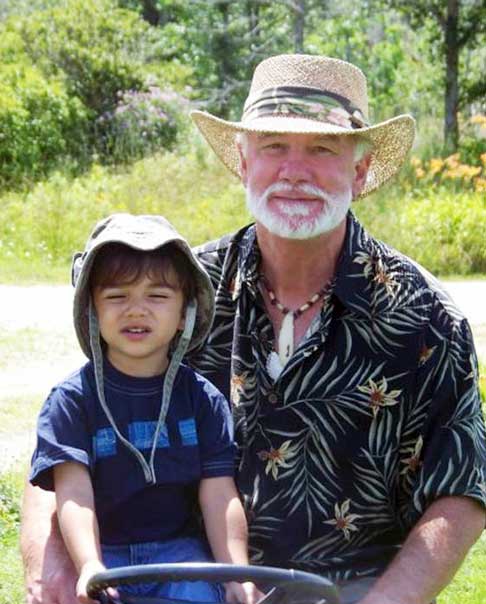 Paul and his grandson.
Paul and his grandson.
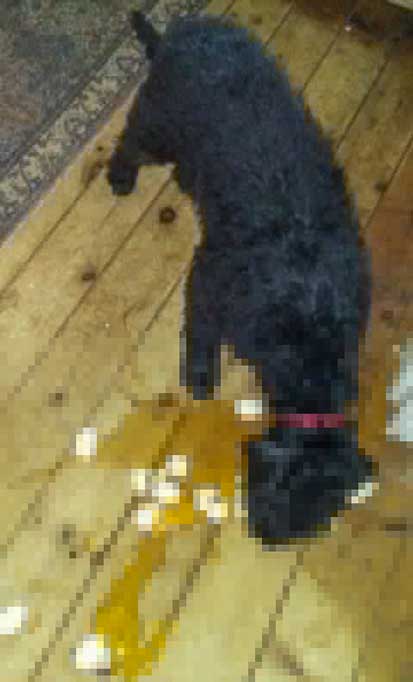
 Paul and Suzanne in more recent times.
Paul and Suzanne in more recent times.
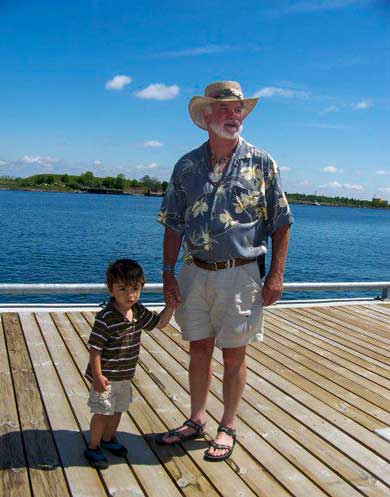 Paul and his grandson in Little Current.
Paul and his grandson in Little Current.
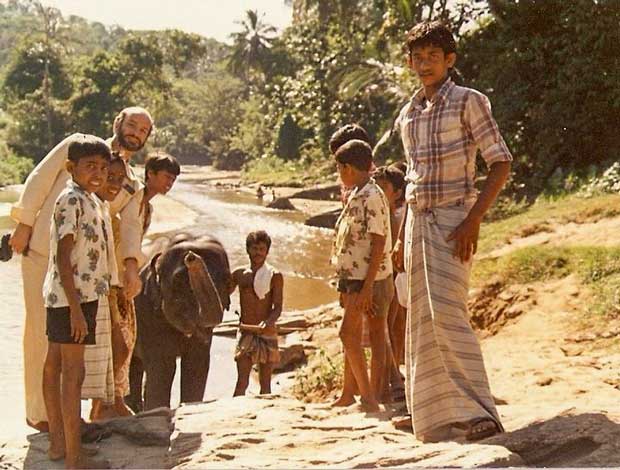 Paul is in Sri Lanka heading for Kandy and an orchid collection. An elephant is being washed in the background.
Paul is in Sri Lanka heading for Kandy and an orchid collection. An elephant is being washed in the background.
 Saudi Arabia where Paul and Sue had to dip their ‘right’ hands into a large bowl to get their food.
Saudi Arabia where Paul and Sue had to dip their ‘right’ hands into a large bowl to get their food.
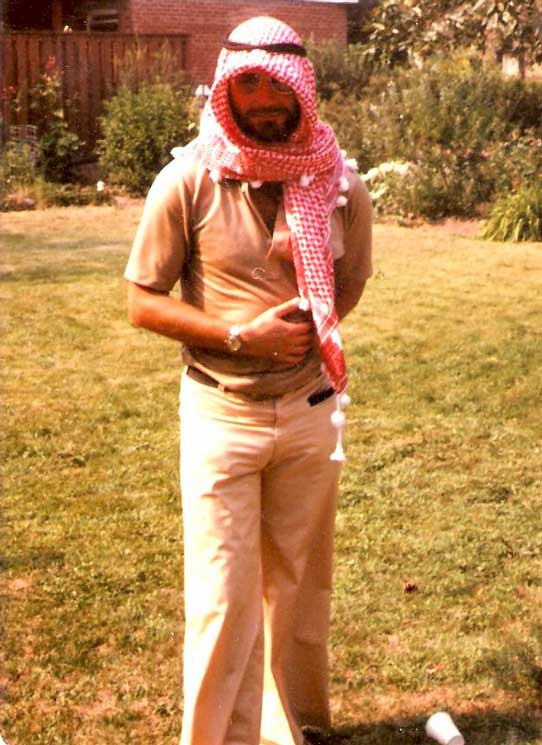 Paul newly arrived from Riyadh.
Paul newly arrived from Riyadh.
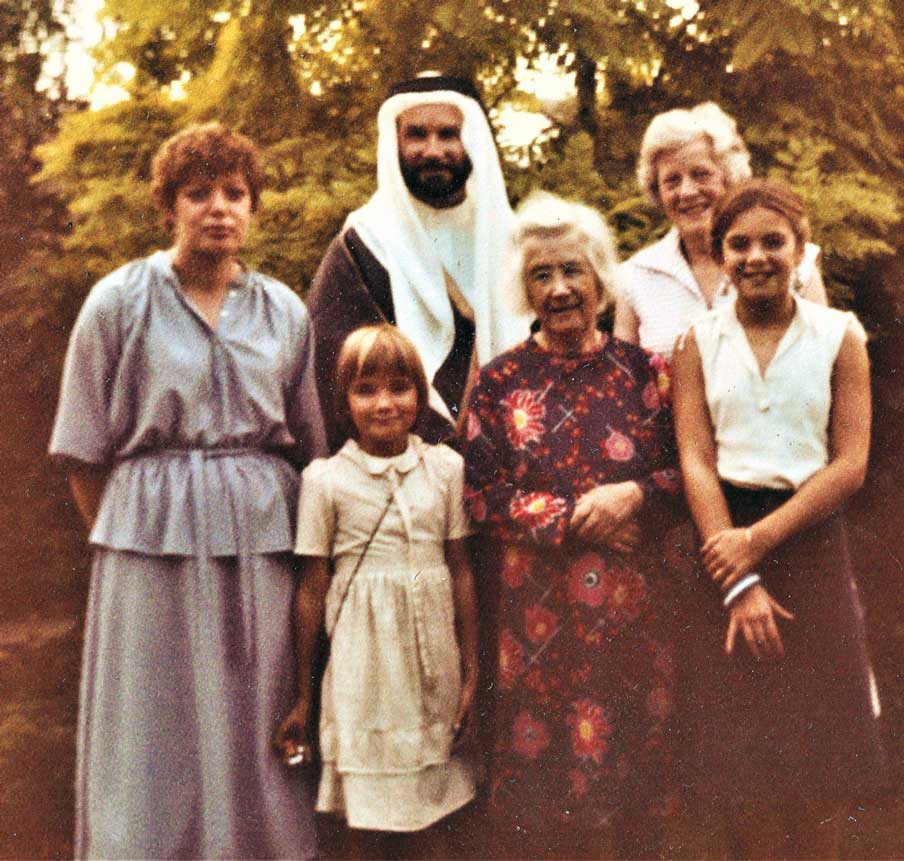 Paul visiting his mother after some months in Riyadh, 1978.
Paul visiting his mother after some months in Riyadh, 1978.
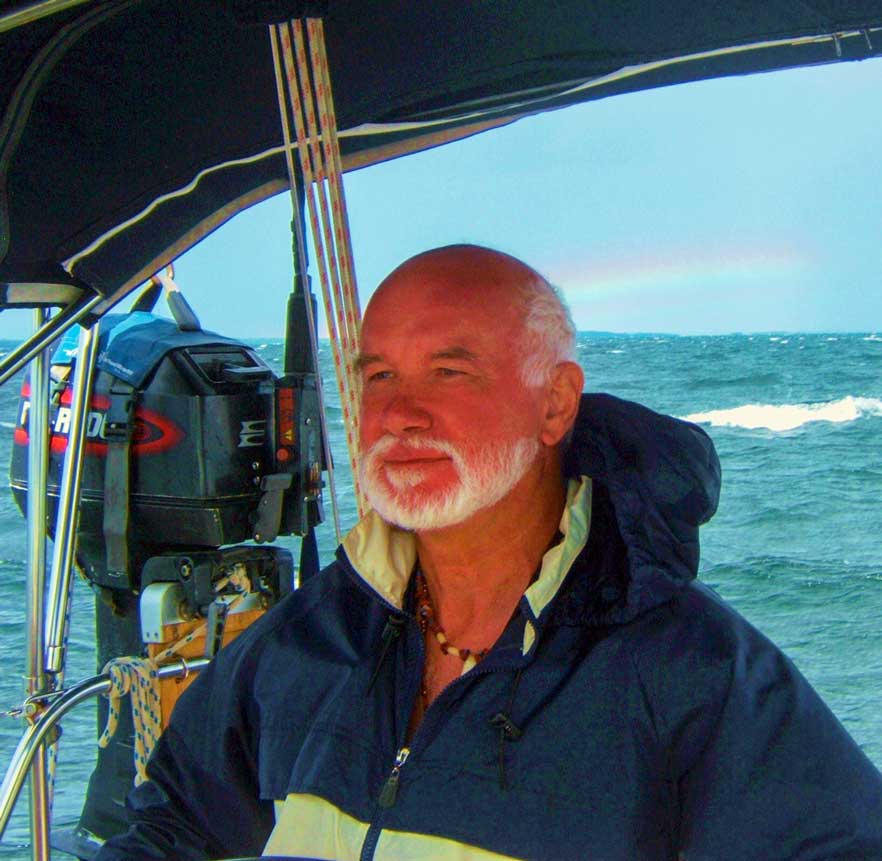
 Sadie.
Sadie.
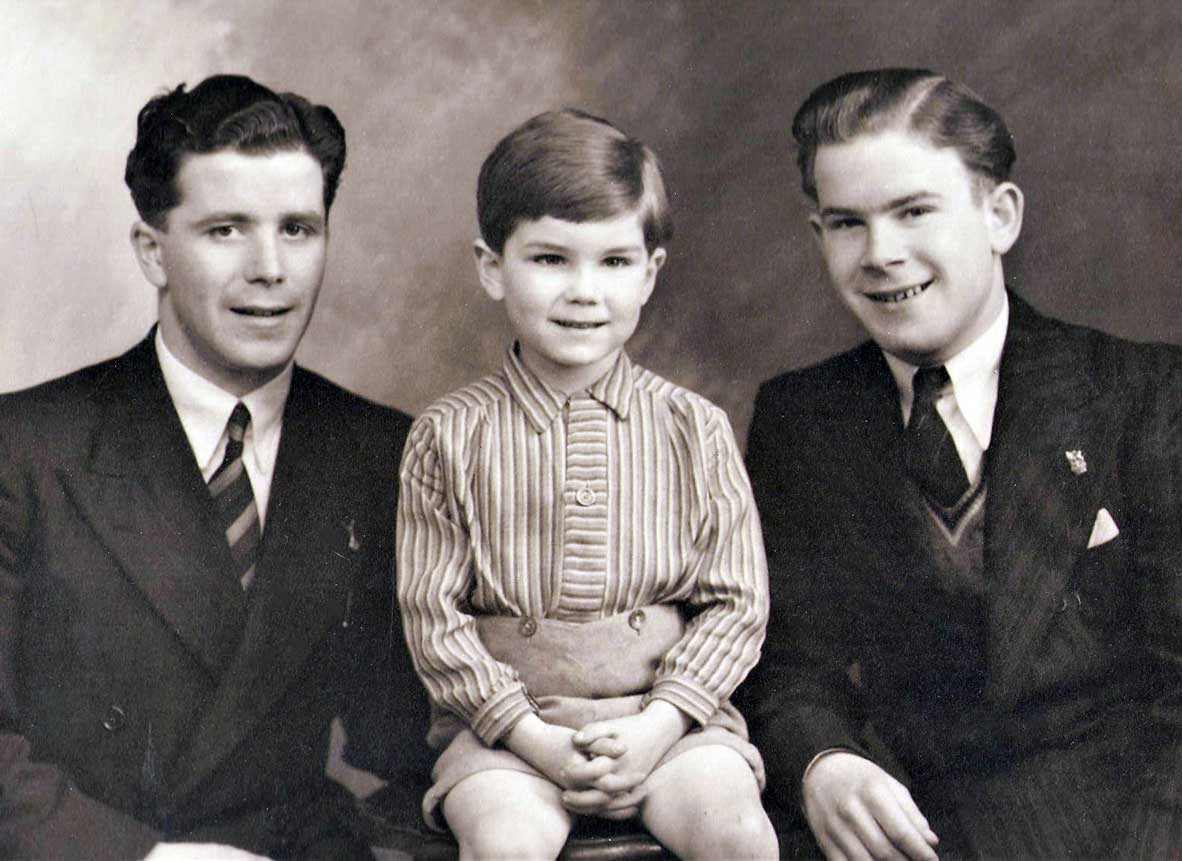 Studio portrait of Paul with his two older brothers Peter, left, 20 years older and Patrick, right, 15 years older.
Studio portrait of Paul with his two older brothers Peter, left, 20 years older and Patrick, right, 15 years older.

